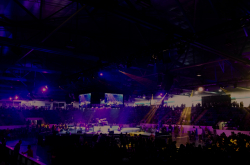Valentin Shchyokin, creator of the horror game Never Again
Three years ago, I had no idea that I would move into game development. I was a musician working as a sound engineer until something clicked, and I decided to make my first game. I was completely alone in this, too, but that was my own decision. First I developed by day only, but then slowly but surely the project started taking all of my free time. Each weekday would end with me darting out of the office with a laptop in hand excited to come home and get to work. It took me two years to create Never Again, but I did it, and you can now buy it in the online shop Steam.
At first, I didn’t have a clue on how to actually make games. Though the Unreal Engine seemed a child’s play that would allow me to do whatever I wanted with my world as if I were some kind of an all-powerful magician. But it wasn’t as easy as I expected: I had to do a lot of faking. I thought that I’d become a magician, but in reality it was an illusionist that I ended up as.
My motto is, no task is unsolvable. But that’s just putting a brave face on my part, because some tasks really are, and you can do nothing about it. Either you wait until the engine creators fix the problem, or you give up. Another option is attending meetups like this one and networking with some brainy people who will kindly suggest a solution.
I used to think, ‘Just give me a sec and I’ll make a cool narrative game with a spot-on design that will 100% look like the real world.’ Turns out, all game engines don’t work that well with indirect lighting. I spent a whole year trying to figure out how to make the picture more true-to-life.

What I didn’t have problems with, though, was to start selling my game in Steam. The process was very simple: they added it to the shop after a month of testing. While in another online video-game store, GOG, all I got was ‘Well done, but we don’t think it would sell.’ That was a stimulus and a half! I wonder what they’d be saying now if they found out that 8,000 people and counting have purchased Never Again on Steam.
Don’t be shy to ask people in the community to help you solve difficult tasks. There’s a specialized group on VK, for example. Ask the most stupid questions if that helps you even a tiny bit. You will get some trolling at first, for sure, but you’ll also get answers. And in time, when it’ll be you who answers these rookie questions, you’ll be invited to a chat with some in-depth professional discussions going on. Instead of just sitting there and mindlessly scrolling through social media, it’s always better to be proactive and ask questions. The community will help you with your growth.
Look after your health – it’s an absolute must. When I was a musician, I took it for granted because all this running around on stage kept me in shape. As soon as I started with game development, I gained 15 kilograms in a blink of an eye, and all this weight didn’t come out of the blue. A typical working day of a developer is, we sit glued to our computers, then we lay down a bit, then clean our teeth and go to bed. So when I earned enough money for a gym subscription, I ran out to buy it.
The more work you accomplish the more accomplishments you’ll have: the faster you’ll make one game, the quicker you’ll earn money and move on to your second one, which is bound to be better than your first.

Alexander Galeev, game designer at the studio Space Sauce and creator of the game Singular Space
I’m a bad programmer but a good game designer: it’s my sixth year of working in the field. Recently I’ve been focusing on creating PvP game prototypes. I do all but content, from writing code to preparing game design where artificial intelligence serves as users’ opponent.
A year ago, my friend from work and I found ourselves in a lucky situation where we could do whatever we pleased. So we thought about it and settled on a couple of features that would make our future product special:
- the space, because we love SciFi;
- mobile platforms, because we’re ambitious and want to make good money;
- session matches, because we want lots of drive;
- a cool gameplay, just because;
- a design with a feeling, because we want full user immersion.

In a nutshell, what we wanted was to make a unique strategy game for mobile platforms, but that proved to be fraught with difficulties. How to make a convenient interface, how to understand what happens in the heat of a space battle, how to make spaceships pop? After the first prototype, we turned the tables on these problems and decided to continue with our crazy venture.
After a few tweaks in the concept, we created a MOBA-genre game in the spirit of DOTA and League of Legends with turrets and footholds and training camps. It was a far cry from the game we originally envisaged, but that’s what creative process is usually like, anyway, so why not? The most important thing is that we’re happy with our brainchild. Flexibility is one of the most banal yet crucial aspects of game development that people usually tend to forget about.

Here’s what we learned in the course of our work on Singular Space:
First, it’s important to think about how game mechanisms you use when developing will look like in the actual game. Until you prototype it and do the first tests on a specific device you created it for, your project will still be up in the air. You sure can imagine stuff, but this doesn’t mean it will work that way. Make sure you always put your ideas into practice. They may turn out great, or they may not; in this case, it’s better to axe it without regrets.
Second, try to work with universal, tried-and-tested design solutions. Sometimes you get really excited about these cool new tools you find, but they end up just not fitting into your game. It just doesn’t work, and that’s it. So try to opt for all-inclusive solutions, anticipate possible changes, and go a maximum ad minima.
Third, always put the gameplay you’re working on into the broader perspective. In our last project, we had two models of fire shooting to pick from, and went at it hammer and tongs trying to prove to each other which one’s the best. They were completely different from the game design point of view. But the trials turned in a completely unexpected result: users just didn’t care, all they wanted was to play. So don’t get too fixated on the specifics, they don’t really matter that much in the grand scheme of things.

Leonid Gorbachev, staff member at Octobox Interactive and the meetup’s organizer
Four years ago, our team launched its first project that operated on Unreal Engine. Back then, we struggled to find a programmer with relevant experience, not to mention a local community to exchange knowledge with.
Now, we have a unique opportunity to help young teams master the technology and connect with like-minded people from other studios. In the future, we will continue with our initiative and add in new formats of interaction like round-tables and project presentations.
Andrey Karsakov, Head of the education program ‘Game Development Technologies’
The exchange of experience and expertise that happens at meetups and conferences makes for a strong impetus for the development of both individual specialists and the industry at large. Last year, we launched a new Master’s program on game development, and so just couldn’t disregard such an effective way of sharing knowledge as meetups like this one. Being an academic partner of Unreal Engine, we were really glad to host the event; apart from benefitting the gaming community, it also proved very useful for our students who got a one-off opportunity to establish contacts with the industry.

For becoming a game developer doesn’t only mean working for a big company or launching your own game. It is only by communicating with people who are driven by the same passions and ideas as you are: making great games, sharing experience and taking it on board, you become part of the gamedev family.
From the very get-go, we at ITMO.GAMEDEV have been actively supporting St. Petersburg and Russia’s community of game developers and plan on expanding the range of thematic events we host at ITMO.
You can watch the meetup in full here.





